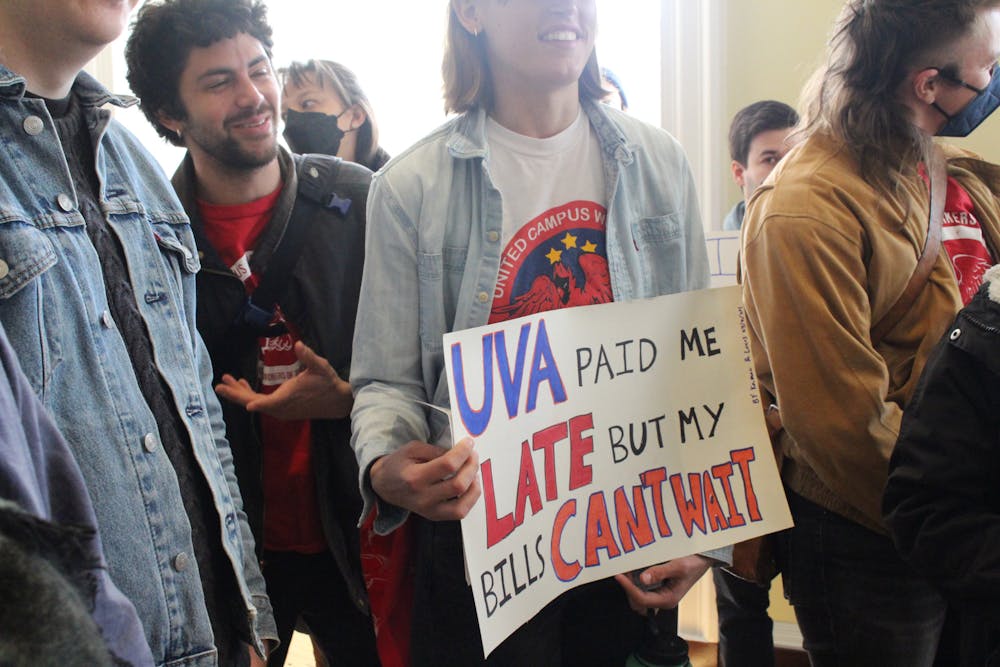In what some graduate students concerned with years of late and incorrect stipend payments see as a turning point, President Jim Ryan has agreed to meet with graduate student leaders April 4 to discuss solutions to the payment problems.
Ryan agreed to meet with graduate students after members of the University's chapter of the United Campus Workers of Virginia attended the March 1 Board of Visitors meeting with signs and flyers detailing their concerns and highlighting the importance of graduate workers for the University’s academic success and longevity. The protest did not disrupt any Board activities.
Provost Ian Baucom recognized their presence towards the end of the Board's morning session and tried to explain to the Board members what issues had prompted their protest at the meeting.
“There was an issue about a year ago,” Baucom said. “That was really quite unfortunate, and I again apologize for when some graduate students received late payments.”
He added that in December there was another instance of late stipend disbursements, limited to a single department. However, according to graduate Arts & Sciences student Jacqui Sahagian, Baucom’s attempt to limit the protestors’ concerns to two instances is a misrepresentation of the truth, and graduate students had to clarify to Board members and Baucom after the meeting that their concerns are not limited to two cases.
“That’s just incorrect,” Sahagian said. “I’m not sure how he didn’t realize that [late stipend payments] have happened many more times and are an ongoing systemic issue. He certainly knows that now.”
Graduate workers who attended the Board meeting said that after the formal meeting ended, they were approached by a number of Board members who asked questions about their concerns. According to the graduate workers, those Board members said that they were not aware of the scale or even the existence of the problem.
After roughly 180 graduate students received late stipends in December 2022, the union sent an open letter to University leaders before organizing other forms of collective action, including an April 2023 rally and a November town hall meeting open to the community. Still, problems persisted, with another significant disbursement problem occurring in December.
The University provides stipends to most graduate students as a way to cover living expenses. Research and teaching assistants are additionally paid wages, though those rarely see the same issues as stipends due to labor laws and legal repercussions, according to some graduate students. Late, incomplete and incorrect stipend payments for graduate students are not a new issue, and the “cut the checks” movement, organized by the union, has been protesting the problem for over a year.
The University has responded to the issue before, most notably through the Jan. 23 formation of a task force designed to come up with recommendations on how to resolve concerns over stipend payments. The task force issued its final report in May, providing a number of recommendations including the creation of a new loan program, changing stipend disbursement dates and improving administrative communication methods. However, graduate Arts & Sciences student Lucas Martinez said the solutions proposed by the task force will not effectively fix the problem.
“Most of the task force solutions are much smaller,” Martinez said. “They kind of assume that all the changes [that need to be made] are minor.”
Notably, the task force differed with graduate students over what it saw as the root cause of the payment problems. The task force cited bureaucratic miscommunication and delays as leading to late payments, but the union and graduate students alike have held firm for over a year that the main cause of the problem is the allocation of resources that has led to low staffing and high turnover rates of positions that oversee graduate pay.
According to these graduate students, the solution to late and missing payments is simply to allocate more resources to staffing administrative positions and not overworking a small group of underworked employees. Graduate Arts & Sciences student Cleo Boyd, who is now in her fourth year of graduate school at the University, said she has seen first hand what administrative turnover can do in terms of facilitating timely and correct payments.
“In the history department, we’ve had someone new in our administrative office [handling disbursements] every year since I’ve been a grad student,” Boyd said. “And that just causes a lot of confusion and when things go wrong, it takes a lot longer to solve them. It's because people are new to their jobs, and we've been chronically understaffed too.”
Despite previously feeling unheard or ignored by the administration, graduate students have said that the recent Board of Visitors protest and the arranged meeting with Ryan have led to them feeling somewhat optimistic that their recommendations will be heard and possibly acted upon. According to Boyd and the Daily Progress, after the protest at the Board meeting, Ryan told graduate students in attendance that, at the planned meeting, they would not leave the room without a solution to the problem.
University spokesperson Bethanie Glover said that the meeting was primarily designed to communicate concerns and did not mention any commitment to developing a resolution to the persistent issue. Though asked, Glover also did not comment on Baucom’s misrepresentation of protestors’ concerns at the Board meeting.
“The purpose of the upcoming meeting is to get a current understanding of the graduate students’ concerns about payments and to keep lines of communication open,” Glover said. “We appreciate the students bringing their concerns to us.”
Nevertheless, to many graduate students, the interest of Board members in their issues and the scheduled meeting with the University president reflects an opportunity to share their thoughts on how to create a lasting solution to the problem.
“It really feels like there’s an opportunity to change things and make them work for the better,” Martinez said. “It feels like this is the attention or respect that we [as graduate students] feel that we deserve and that we haven’t been getting.”







